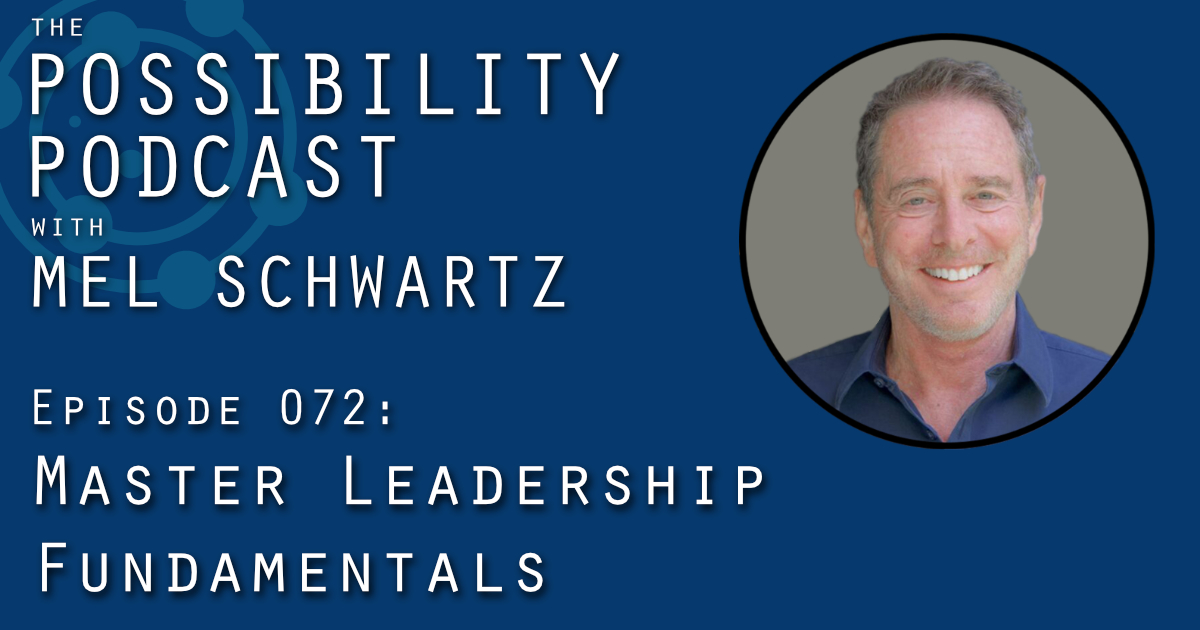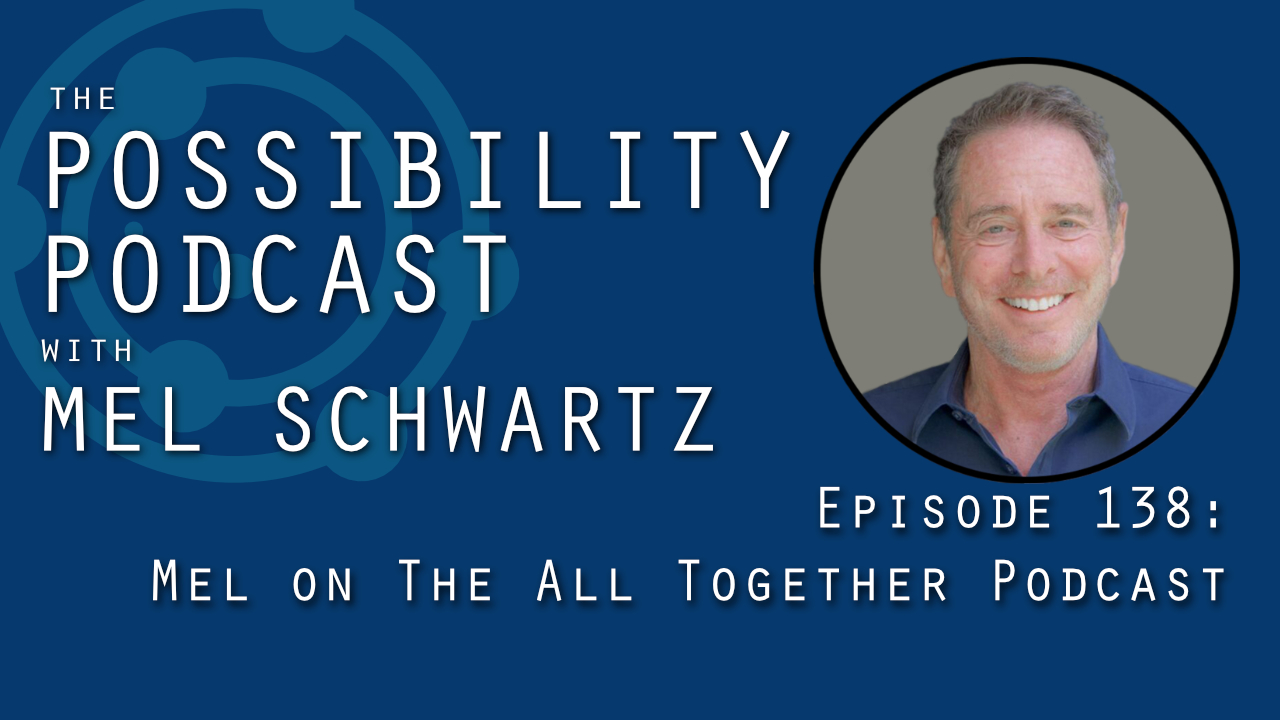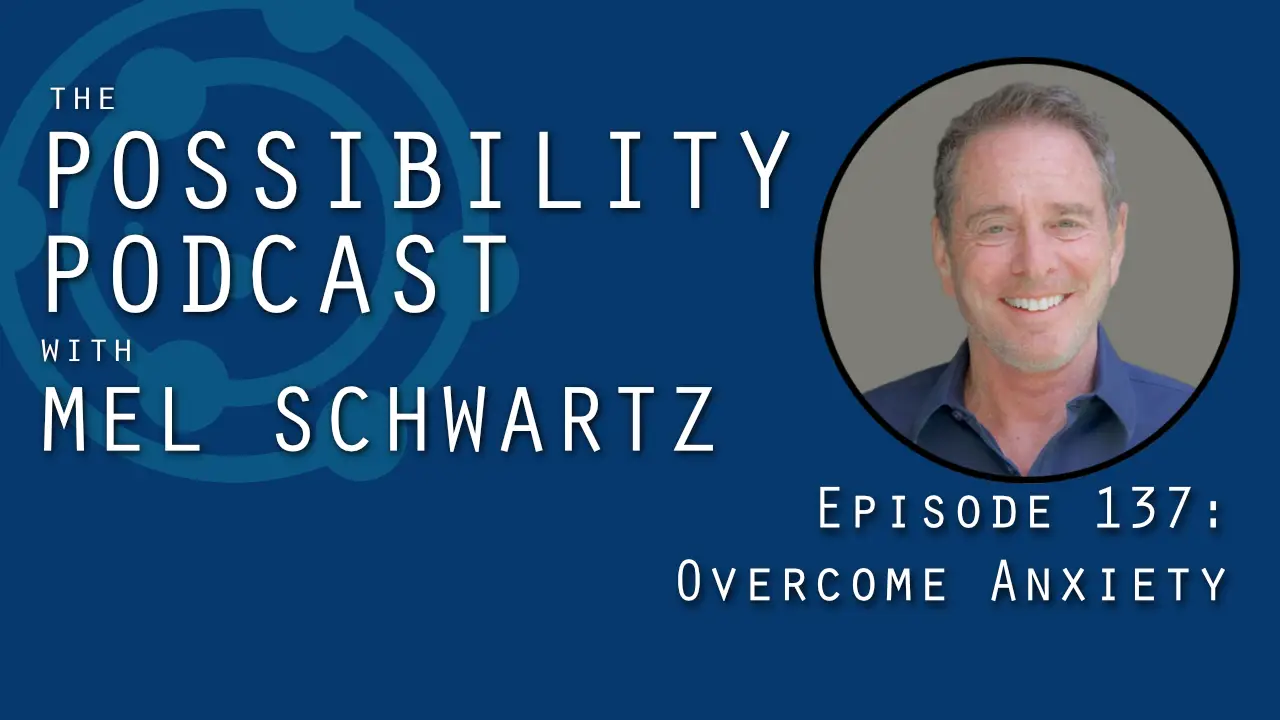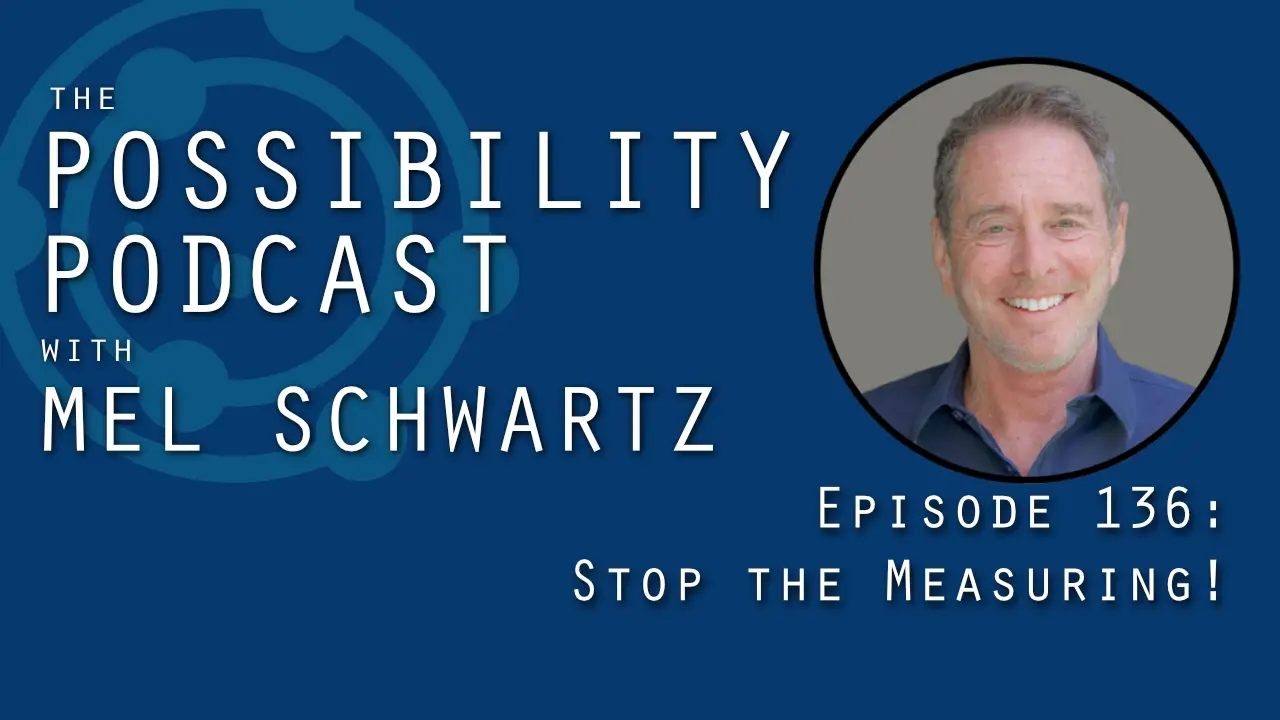Podcast: Play in new window | Download
Subscribe: RSS
In episode 072 of the Possibility Podcast with Mel Schwartz, let’s examine the fundamental pillars of leadership in our personal and business relationships.
Listen to learn…
Interested in bespoke marriage and relationship counseling from Mel Schwartz? Reach out!
- …what we’re talking about when we talk about leadership
- …the difference between passive and participatory leadership
- …what one fundamental quality of an effective leader has in common with the concepts of quantum physics
- …how you can release your inner leader
Do you practice these leadership fundamentals? Can you think of ways you might? Let me know in the comments!
Want to watch this episode?
Transcript of The Possibility Podcast with Mel Schwartz #072
Hi, everybody and welcome to today’s episode of The Possibility Podcast. I’m going to be referring today to the three principles of leadership.
Now, let’s begin by trying to put some description or definition to leadership. A leader is not an authoritarian figure. A leader is not a ruler. A leader is not someone that you’re frightened of or concerned about what they think of you. That’s not leadership. That’s authoritarianism. Leaders inspire, they motivate, and they demonstrate by participating. Not just saying this is what you need to do. I’m behind you. That’s not leadership. Leaders are not what we call nowadays thought leaders. Everybody calls themselves a thought leader. Well, what are they leading? Their thoughts are common. An inspirational thinker can be a thought leader but let’s leave that aside for the moment.
I’m going to propose to you today that there are different qualities to leaderships. There are inner qualities and there are outer qualities. Um some of the qualities of leaders are a sense of fearlessness. Um a sense of following your intuition. It means you’ve done your homework and you’re really diligent and vigilant but there is an intuitive quality where you’re feeling your way along and inspiring others.
Leaders are by definition singular. Not everyone can be a leader. Most of the people have to be in the pack, don’t they? We’ve all heard the term natural born leader. Well, no doubt there are people who are innately, naturally born as leaders but you can learn to become a leader and we’re going to focus a lot on that in this talk. There are external qualities to leaders being able to communicate effectively, seeming confident, well poised, style, body language, personality, and often intelligence. Although no doubt there have been exceptional leaders who were rather average minded. Doesn’t require great intelligence but it can’t hurt.
But the inner path of leadership which we’re going to be focused on can be learned and can be cultivated. Before we dive into that leaders lead what?
They can lead families. The typical patriarchal family of the past was led by the father figure. We’ve evolved thankfully and the leader of a family need not be one gender or another. So, there can be leaders and families, organizations, businesses, teams, sports teams, smaller teams in schools, smaller teams in businesses.
You can be a leader amongst friends. There are so many different ways in which we can lead.
Let’s move into the first pillar of leadership which I am calling emotional intelligence. Now, you’ve heard me speak of emotional intelligence many times. So, let me just step back and describe what I mean.
Emotional intelligence is about my ability to perceive and understand what I am feeling and to effectively communicate that feeling and for me to be able to tune in to what you’re feeling if need be to ask questions to help you open up and share your feelings with me. It’s the ability to communicate with clarity and confidence. Emotional intelligence is a pillar number one.
Now, as a culture, we are increasingly coming to value emotional intelligence but on the whole, it is still devalued. It is considered less important than cognitive intelligence. That whole idea needs to be greatly reconsidered. You can have exceptional cognitive intelligence and yet fail miserably in happiness, leadership, success, cognitive intelligence needs to be joined with emotional intelligence when we have both engines running effectively and sync with each other. Wow. Powerful, real, genuine leadership.
One of the problems we encounter in being emotionally intelligent is we think that our communications, our thoughts and ideas that we’re communicating are received and understood just as we intend them to be.
This is wrong, it is misinformed. We aren’t simply robots exchanging bits of data. We are not computers. We are human beings and the absence of a shared meaning, a tuning in to make sure we’re all on the same page or on the same sentence so to speak is essential to emotional intelligence. We’re going to dive into that a bit more deeply in just a little while.
So, again, we are not robots transacting bits of data. We are complex human beings with our own personal narratives and histories hopes wishes desires traumas feelings and beliefs we need to put that all in the mix when we’re communicating with each other because the disruption of coherent communication is due to a lack of shared meaning now obviously in a simple exchange you can’t inquire as to someone’s own personal narrative and history but we can actually tune in and ask do they understand what we are exchanging what we are informing what does it mean to them we need to have curiosity and lean in to have emotional intelligence.
Curiosity, checking in, tuning in, not just articulating what needs to be done or how to do it but tuning in to each individual in a way whereby we’re seeing it. It’s a corresponding with what we’re saying. That’s the key to correspond. Now, feelings can get in the way of the job and in the business. They often do and I’m not just speaking of business here. We can be talking about family relationship or leadership in any field.
So, emotional intelligence, pillar number one requires deeper levels of knowing and connecting, tuning in to the other person, seeking a correspondence. So, what do I mean by correspondence, it’s literally an active energy field where we actually take the moment and tune in to find out are we really in sync here and if we’re not encouraging in openness and a safety so that both parties can really communicate effectively. When I’m speaking about here is actually a sense of relatedness. So, if it is a large group following one particular leader, we want to create a relatedness where there is an empathy and appreciation. Appreciation of what one another is feeling.
Now, pillar number two, I used to call this emotional transparency. I’ve added the word radical in front. Radical emotional transparency. How did I come to this term? Ray Dalio, the founder of the great hedge fund, the largest hedge fund I believe in the world, Bridgewater, speaks of radical transparency. Simply put the theme in Bridgewater is that you challenge each other about your thoughts, your beliefs, your operating instructions, challenge, challenge, challenge.
What radical transparency is missing though is EQ, emotional quota, emotional intelligence. We need to tune in to how our feelings getting in the way. Obscuring or blocking the communication is coming from the leader on down to everyone else. So, under radical transparency, Bridgewater style, you challenge each other. Why do you think that? Why do you think that’s true? How do you know it’s true? Doesn’t allow for feelings only for thoughts and only for thinking.
That is tragically limited. We can never make believe or pretend that our values, our personal history, our emotions don’t spill over and impact what we think is rational discourse. This is so short minded. Terribly so. So, I’ve added the word emotional to make it radical emotional transparency.
We need to appreciate how our feelings inform and impact the logical data. How we feel is arguably as important as what we think. Our thoughts and feelings impact each other. They are in a dance. They are in relationship with each other. Radical emotional intelligence takes into account what lies beneath and how this impacts everyone. So what I’m referring to is a really a collaborative type of dialogue that checks in to assure that what we’ve just been sharing has been heard and received in the same way we intended it. It only takes a moment. That moment opens the doorway to curiosity, to wonder, to a shared engagement where you’re participating. The leader is participating with those they’re leading and those who led or getting an opportunity to participate with the leader.
Now, leaders then realize that what they intended to communicate may not have come across just as what they thought. It’s alive. There’s a vibrance to this level of dialogue. Now, this checking in process is also respectful. It’s sincere. It enables leaders to get closer to their team because the team is not just being given orders, marching orders, or directions. There’s an allowance for a kindred human spirit to occur which is a quality that great leaders have. That’s why great leaders can inspire.
Think about musicians in an orchestra. Now, for them to be in concert with each other, pun intended, in harmony with each other. We need a conductor to make certain that they are all attuned in playing from the same musical score. The same holds true for leaders.
Now, other qualities of great leaders, authenticity. A rare, unique talent. Authenticity means that there’s no fear. There’s no fear about what I think you think of me. Authenticity requires a leader to share their own doubts, insecurities, their own troubles, how they’ve navigated mishaps in the past, authenticity, deeply genuine self-esteem, important quality for a leader. Unique. Firstly, authenticity is unique and is extra ordinary. Extraordinary, extra ordinary.
When you think of a leader, think perhaps Dalai Lama as a leader. Does he strike you as unique, extraordinary, and authentic by all means. So, to cultivate your own ability to be a leader means working on your self esteem, authentic self esteem where you have nothing to hide and nothing to fear. As an authentic leader, you truly welcome criticism and critical feedback. It’s part of the generative learning process. A genuine sharing of your own inner self. Your life’s travels, your hardships, your struggles. We don’t worry about what we’re going to say next. We can be comfortable in silence. We can be comfortable in confusion.
You know, the genuine quality of a leader when asked a certain questions. We can stand back and say, interesting question. I’ve never considered that. Let’s all think about that. Let me think about it. That leader is present in the moment. Genuine and authentic. So, you see the sense of leadership that I’m talking about is evolving. It’s flowing. It’s emerging. It’s never static. It’s tuning in. It’s creative. It’s curious.
Third pillar of leadership. Embracing uncertainty. I know you’ve heard me speak about the embrace of uncertainty so often you’re probably tired of it by now but it’s so critical. A leader or a so-called leader who’s seeking certainty is not a leader. That’s working from a mathematical equation. A leader must embrace uncertainty. You can’t lead by sitting back and predict it. You can’t be a spectator and a leader at the same time. You need to participate and engage. You have to get out in front.
Now, to get out in front means that you’re in the field of uncertainty. It’s kind of like follow me, we’ll figure this out, I’ll take the lead. Now, the leader must be informed by information to a certain extent but that’s just part of the equation. That same leader gain informed by information but not suffocated by data. That’s not leadership. You see, the leader I’m describing is intuitive. He leads by stepping out in the front.
You know, there are military pictures or allusions that come to mind is the general leading from behind and commanding the troops forward or is the leader out in front. Now, again, the orchestra conductor in concert is a leader. It’s participatory with the music. The leader cannot be fearful of making a mistake. Mistakes will be made. Errors will be made. But the leader can’t be in fear of making a mistake. Which means if you get stuck in analyzing too much in the predictive quality that is not leadership.
Now we need to think of this. If we analyze too much and interpret data too much is a consequence of inaction. We worry about the consequences of our actions. What about the consequence of inaction? You can’t lead and be spending all of your time head down analyzing data. Authentic leaders don’t fret the consequences of their actions. This is much as they consider the consequences of their inactions. This is a participatory leadership and you participate in the unfolding of possibilities, not charting the future but embracing the uncertainty.
It’s kind of like what in quantum physics is called a reality making process. Reality is perpetually remaking itself. Everything is flowing. The leader who follows all three pillars of leadership is out in front in the flow. Navigating. Navigating uncertainty. Seeing opportunities and possibilities and uncertainty. Not leading from behind.
Well, I hope this conversation about the three pillars of leadership piques some new thinking on your part, perhaps inspirationally so and there is so much more to be discussed around this and it’s correlation to authentic self esteem. If you haven’t listened to my episode developing authentic self esteem, I encourage you to do so. It really dovetails very well with this discussion on leadership.
And I’ll conclude with this thought. There is a leader that lies within you. Summon that leader up. Welcome that leader into the light. Showcase that leader in you because a genuine and powerful leader has to be a leader within their own selves first before they can lead others.
Subscribe to The Possibility Podcast with Mel Schwartz
Don’t miss a single Possibility Podcast with Mel Schwartz! Subscribe for free in iTunes / Apple Podcasts, Spotify, RadioPublic, Spreaker, or wherever you listen to podcasts. Or, simply copy / paste the RSS link directly into the podcast app of your choice!
Please Rate and Review
If you enjoy The Possibility Podcast with Mel Schwartz, please take a moment to rate and review the show in iTunes / Apple Podcasts or Podchaser. It only takes a few minutes, and adding your review is as easy as clicking this link.
Your rating and review helps raise the visibility of The Possibility Podcast with Mel Schwartz, especially on iTunes / Apple Podcasts, which is one of the biggest podcasting platforms today. More visibility for the show means more listeners… and that growth means the show reaches — and helps — more people like you.
Thank you!
Talk With Mel!
Help others when Mel helps you: Contact Mel and find out how you can be a caller on the show and ask Mel a question. He’ll put the Possibility Principle to work for you, and your conversation will be recorded for use in a future episode of the podcast so other listeners can benefit.




